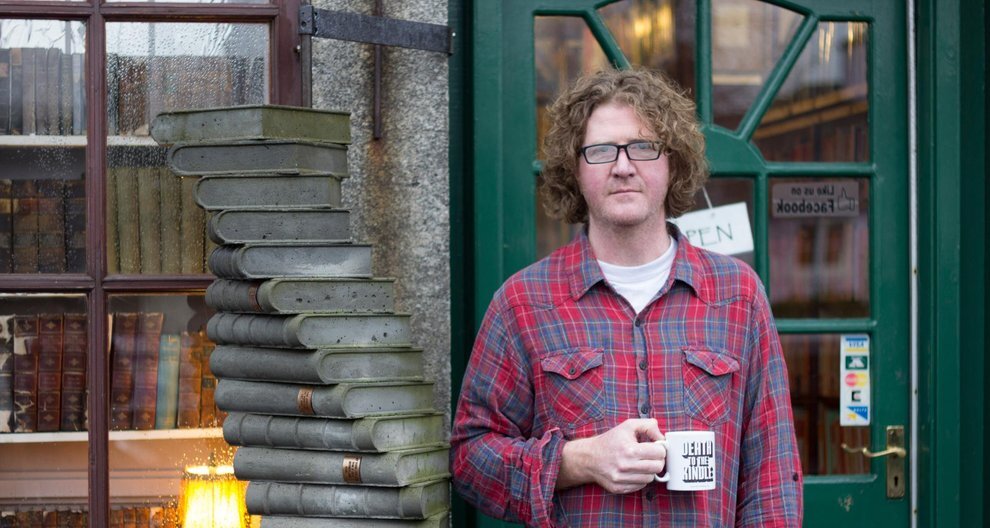You are viewing your 1 free article this month. Login to read more articles.
Shaun Bythell | 'What I object to is the digitisation of everything that's ever been printed'
 Caroline Sanderson
Caroline SandersonCaroline Sanderson is a non-fiction writer, editor and books journalist. Her books include a travel narrative, A Rambling Fancy: in the F ...more

Caroline Sanderson is a non-fiction writer, editor and books journalist. Her books include a travel narrative, A Rambling Fancy: in the F ...more
“Would I like to be a bookseller de métier? On the whole... no”. So said George Orwell of his time working in a second-hand bookshop in the 1930s. Eight decades later, extracts from his essay “Bookshop Memories” provide a counterpoint throughout Shaun Bythell’s diary of one random year running The Bookshop in Wigtown. Wry, irreverent, cantankerous and frequently laugh-out-loud hilarious, The Diary of a Bookseller (Profile, September) is the most entertaining book in diary form since Nina Stibbe’s Love, Nina, and will delight anyone who loved the nihilistic “Black Books”, starring Dylan Moran, surely one of the finest TV sitcoms ever made.
Down the line from Wigtown, Bythell freely admits that he fell into the métier of bookseller. On a return visit to his native Galloway, still struggling at the age of 30 to find a job he enjoyed, he happened to call into The Bookshop and found the owner keen to sell because he wanted to retire. “Bookselling was never something I’d even considered until John, the previous owner suggested it. I said to him: ‘I haven’t got any money.’ He said: ‘You don’t need money, that’s what banks are for.’ So I went to the bank and they lent me the money.” Sixteen years later, Bythell is still running Scotland’s largest second-hand bookshop, with over a mile of shelving and stock of around 100,000 books.
Google masquerades as being egalitarian, giving everyone access to everything for free, but the consequences aren’t good for anyone in the book industry
The Diary of a Bookseller charts the everyday trials and travails of its frequently crabby author as he attempts to satisfy the requests of perennially annoying customers, drives hundreds of miles every week on the trail of new stock, and grapples with the eccentricities of his staff, among them Nicky, who looms large in the diary with her Foodie Fridays (for which she provides unfailingly disgusting offerings, dredged up from a skip behind Morrisons) and her misplaced drive to create a new section, Home Front Novels.
A rich well
Why did Bythell start writing the diary? “From very early on, everybody who worked with me said: ‘There’s enough material here to write a book.’ And I’d always thought in the back of my mind that I would. Then Jen Campbell’s Weird Things Customers Say in Bookshops came out and I thought, ‘Oh, bloody hell’ - I was furious with myself for not having done it. Then someone suggested I keep a diary to use as an aide-mémoire if I ever did get around to writing anything. After I’d done that for a year, I sent the diary to literary agent Jenny Brown in Edinburgh. It was pretty dreadful, but she was fantastic and helped me get it into shape.”
I apologise for being a little late in phoning Bythell for our interview. Truth is, I got hopelessly distracted watching the shop’s anarchic posts on YouTube. They include a cover version of “Rapper’s Delight” by The Sugarhill Gang, entitled “Reader’s Delight” (sample lyric: “I’ve got more stock than an Oxo cube and I stock it alphabetically”), which features Bythell rapping in tweed, alongside a black-ski-suit-clad Nicky. There is also a series of “Kindle tutorials”, showcasing Bythell’s ongoing campaign to save bricks-and-mortar bookshops from the evils of Amazon. One features Bythell taking a shotgun to a Kindle with a damaged screen; another shows him transforming an ordinary Kindle into a “Kindle Fire” by torching it in the back garden.
Surely he can’t deny that e-readers have their place? “I don’t actually have a problem with people buying stuff on Kindle; I do accept that technology has its advantages. What I object to is the digitisation of everything that’s ever been printed. Google masquerades as being egalitarian, giving everyone access to everything for free, but the consequences aren’t good for anyone in the book industry.” Until around a year and half ago, some 25% of The Bookshop’s sales came online. Then Bythell found himself suspended from Amazon for a minor, innocent administrative infringement. “I haven’t been able to get back on since. Although it’s cost me about £12,000 a year, the joy I get from not having to deal with Amazon is worth almost every penny.”
Bythell continues to sell through Abe, with online sales now worth around 15% of the business. He tells me he looked into setting up a bigger online operation, selling from a warehouse through both Amazon and Abe. “But they’re so greedy! Amazon takes about 30% of what you sell a book for. That was my margin when I started out, and it’s just gobbled it up. Unless you’re dealing in really vast quantities, it’s just not worth it. You can barely make a living. And that has ramifications for everybody else as well: bricks-and-mortar shops as well as online sellers.”
One hugely positive development to set against these declining margins is the fact that Wigtown, situated in a remote corner of Scotland, is now a destination for book lovers from all over the world, thanks to its designation as Scotland’s National Book Town in 1998, and the founding of the Wigtown Book Festival in 1999. From modest beginnings, the festival now stages more than 200 events each autumn, and Bythell emphasises the role it has played in the town’s regeneration. “Wigtown was basically on its knees before it gained Book Town status. I think last year the festival attracted 16,000 people, so for the economy of the area it’s crucial. Many first-time visitors tell their friends or come back on holiday. That has a snowball effect. Without the festival, my footfall would probably be about half of what it is.”
Office romance
Much of the entertainment value in The Diary of a Bookseller derives from the essential banality of life as a second-hand bookseller: the absence of customers on a cold winter’s day; the antics of Captain, the shop’s cat; and the unwelcome regular appearances of Nicky’s irrepressible suitor, Smelly Kelly, who reeks of Brut 33. But for those of us whose focus is almost entirely on new books, The Diary of a Bookseller also provides useful reflection on the role of second-hand bookshops in ensuring a useful afterlife for the titles to which we pay scant attention after their first few months of life.
Here Bythell does extoll the romance of his trade. “I think something like 80 million books have been published in English since Caxton set up his press. It’s just extraordinary to think about the huge amount of literature out there which lives forever... Well, until I take it to the recycling plant. I like the idea that books have multiple lives. They get read by different people in different situations, and you never quite know who’s handled them. It’s a kind of mystery. I remember a friend saying that she thought it was fascinating that her copy of The Secret History by Donna Tartt had its own secret history.”
I ask Bythell to name his best second-hand find, the book that emerged from the most unpromising of circumstances. He asks for some time to think about it. Later a text arrives. “I once cleared 12,000 books from a house near Edinburgh on an ugly modern estate. The books were in the garage, packed two-deep on the shelves, and almost all had been partly eaten by mice over several decades. As I finished sorting them, in despair of finding anything even remotely valuable, I discovered several Ian Fleming first editions in pristine jackets. Miraculously, the mice hadn’t touched them. I put the books into an Edinburgh auction where three broke world records... Is that any good?”









